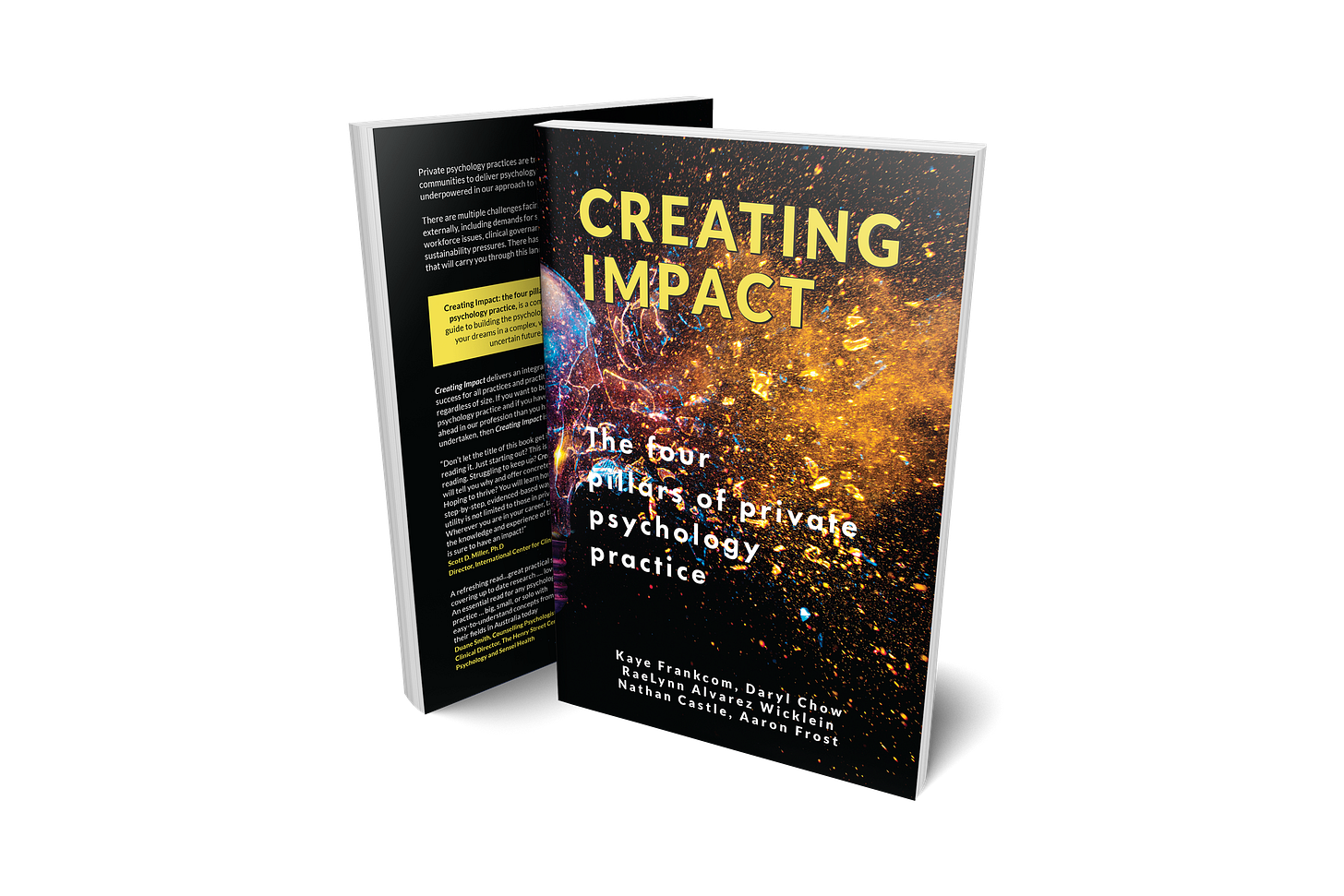FF114: Existence (Part V) ⭕️
The Sweet Spot, The Active Life, Peeping Neighbors and "Do Not Find Meaning in Life"... Some interesting subtitle.
My head is spinning just to think about it. In a span of 7 days, I've connected with teams from Europe, North America, Hong Kong, Singapore.
It's striking to notice how much the most personal things are often universal.
It's Official:
The Reigniting Clinical Supervision (RCS) Course, Cohort #13 Start Date is set for 2nd of Jan 2023.
We will release more details of registration next week. Those who are on the waitlist will get priority to sign up before it’s made public.
Onward with this week’s Frontiers Friday, five recommendations, which is Part V on the topic of Existence.
📕 Read: The Sweet Spot
I'm drawn to Paul Bloom's writings, as he's has a sort of contrarian mind (I mean, his previous book was called Against Empathy).
In The Sweet Spot, Bloom makes the case how suffering is an essential source of both pleasure and meaning in our lives.
Here's some interesting snippets:
On the dark side of flow states:
“Viewed through the experiential lens of flow, a good life is one that is characterized by complete absorption in what one does” (italics theirs). But this is actually a poor answer to the question of what constitutes a good life.
Flow can be trivial. Crossword puzzles can be, for me and others, flow experiences, but a life of doing crossword puzzles would be a huge waste. And actually, as Csikszentmihalyi himself has discussed elsewhere, flow can be a lot worse than trivial. Adolf Eichmann, a key organizer of the Holocaust, has often been described as someone with no malice toward the Jews. He was an expert who sought to do a good job, and he took pride in mastering a complex and technically challenging task.
Csikszentmihalyi suggests that Eichmann “probably experienced flow as he shuffled the intricate schedules of trains, making certain that the scarce rolling stock was available where needed, and that the bodies were transported at the least expense. He never seemed to ask whether what he was asked to do was right or wrong. As long as he followed orders, his consciousness was in harmony.”
On morality:
“What about morality? Many meaningful pursuits are moral. To use a milder example, climbing Mount Everest is seen by many as worthwhile and important, but I doubt that even the climbers themselves would frame it as good.”
On suffering:
“You’ll notice that suffering is not one of the criteria here. But given that meaning involves the pursuit of significant and impactful goals, meaning will inevitably come with suffering—with difficulty and anxiety and conflict and perhaps much more. When one chooses to have a child or go to war or climb a mountain, one might not wish for or welcome suffering. But it always comes along for the ride."
‘...Seneca put it, “Things that were hard to bear are sweet to remember.”’
This point echoes Viktor Frankl's words "“In some ways suffering ceases to be suffering at the moment it finds a meaning." (more on Frankl in previous FF113)
On parenting:
“...in the study by Baumeister and his colleagues on meaning and happiness... they found that the more time people spent taking care of children, the more meaningful their lives were—even though they reported that their lives were no happier.”
On the pursuit of meaning:
“American Freshman Survey, which found that in the late 1960s, 86 percent of respondents claimed that “developing a meaningful life philosophy” was “essential” or “very important,” while in the 2000s, the proportion dropped to 40 percent. She is disappointed in this; she sees it as a bad sign. I don’t. It might reflect a lack of interest in a meaningful life, and less engagement in one. But it could also be that the youth of today are less full of themselves. Maybe they put more energy into living and less into thinking about how they are living.
...The general point here is that you can achieve a meaningful life without knowing that you’re trying to achieve it or thinking about it at all.”
📕 Read: The Active Life by Parker Palmer
This is going down as one of my favourite books in 2021.
Readers of the Frontiers will notice that I gravitate towards Parker Palmer's work.
In the Active Life, he takes evocative story from a variety of religious traditions, including Taoist, Jewish, and Christian, that can help people who are seeking deeper meaning and spirituality, especially for those who are knee-deep in the frenetic busyness of modern living.
There is a profound story that he cites from the Jewish philosopher, Martin Buber in Chapter 5, Where Angels Fear to Thread.
🎥 Watch: The Neigbors' Window Short Film
This short-film hits home on a point that we need to be reminded about: Comparison is the root of suffering.
📜 From My Desk (Archive): Do Not Find Meaning in Life
Some wise words that inspired MLK.
⏸ Words Worth Contemplating:
"Attention is the purest and rarest form of generosity."
~ Simone Weil.
(Hat Tip to Tom O'Connor for pointing me to Simone Weil's work.)
Reflection
"If you focus on what you lack, you lose what you have. If you focus on what you have, you gain what you lack." (Greg McKeown)
So where are you placing your attention today?
What and who do you need to notice, that may lead you to an involuntary gratitude of what you have?
BIG HUGS TO NEW PEOPLE WHO ARE AT THEIR FRONTIER!
If you've just joined us, I'm glad you can join us at the "bleeding edge." Feel free to check out the back catalogue of Frontiers of Psychotherapists Development (FPD). You might also want to go into specific topics in the FPD Archives like
And if you want to see past newsletters, the entire archive is now made available in substack.
In case you missed it, see the most recent missives
Devotion to the Craft (6 Parts)
Caring for People in Organisations (3 Parts)
Clinical Supervision (3 Parts)
Feedback Informed Treatment (4 Parts)
Unintended Consequences (2 Parts)
Deep Learner (4 Parts)
Going Further with Deep Learner and The Use of Obsidian (6 Parts)
See What You Hear, Hear What You See (4 Parts)
Trauma (3 Parts)
Deliberate Practice (5 Parts)
Empathy (6 Parts)
Therapist Effects (2 Parts)
Client Point of View (4 Parts)
Tech Tools for Therapists (4 Parts)
Emotions (6 Parts)
Sensitivity (3 Parts)
Alliance (6 Parts)
My other blog site is called FullCircles: Reflections on Living
By the way, don't feel bad if you want to unsubscribe to this newsletter. This might not be for you. The last thing I want is to add to the anxious clutter of our inboxes.
Daryl Chow Ph.D. is the author of The First Kiss, co-author of Better Results, and The Write to Recovery, Creating Impact, and the forthcoming book The Field Guide to Better Results.
Note:
These newsletter are free, many hours are spent handpicking the curated list that make it to Frontiers Friday, as well as writing the essays and recording the videos and podcasts. Amazon affiliate links, if any, are to help ease the costs. You can also support the sustenance of this work by picking up any of the books, or gifting them to others.
Big thanks.
p/s: Please excuse any typos.






